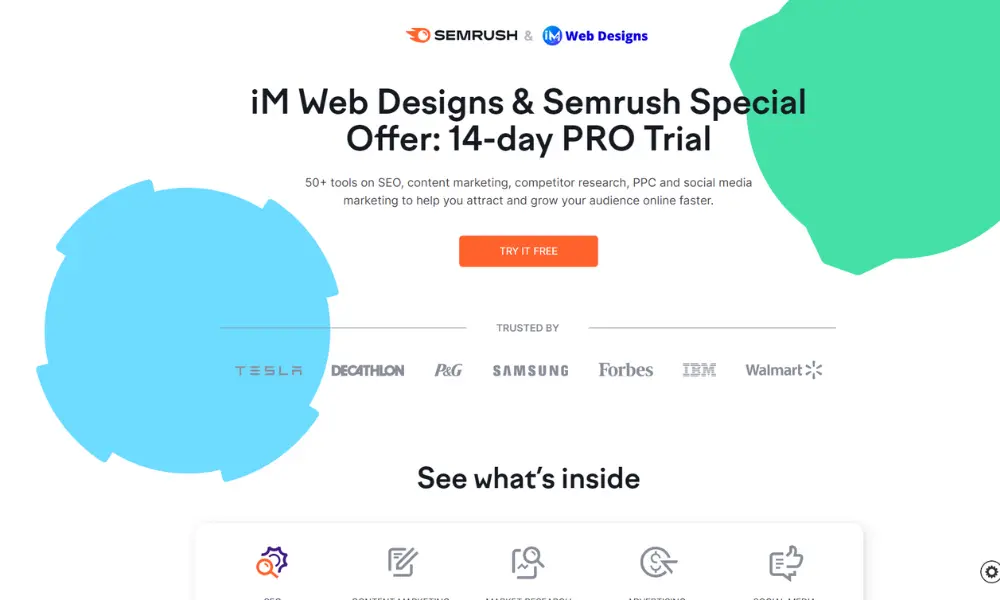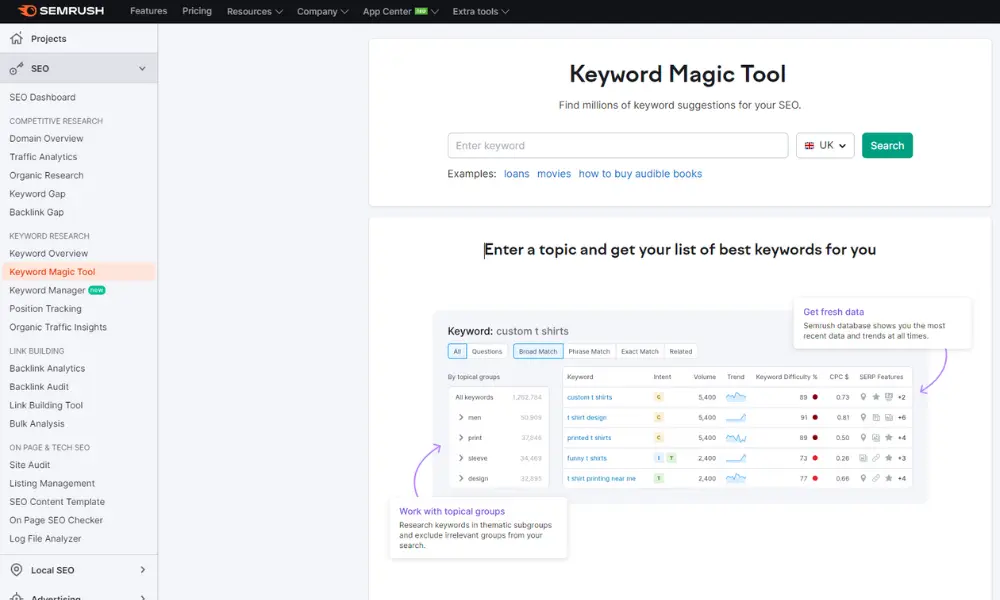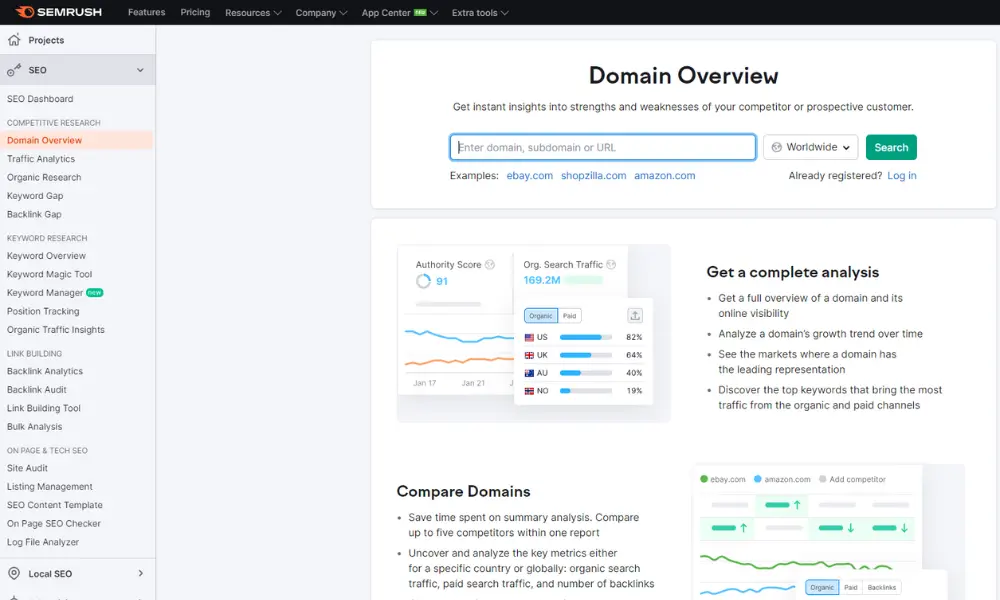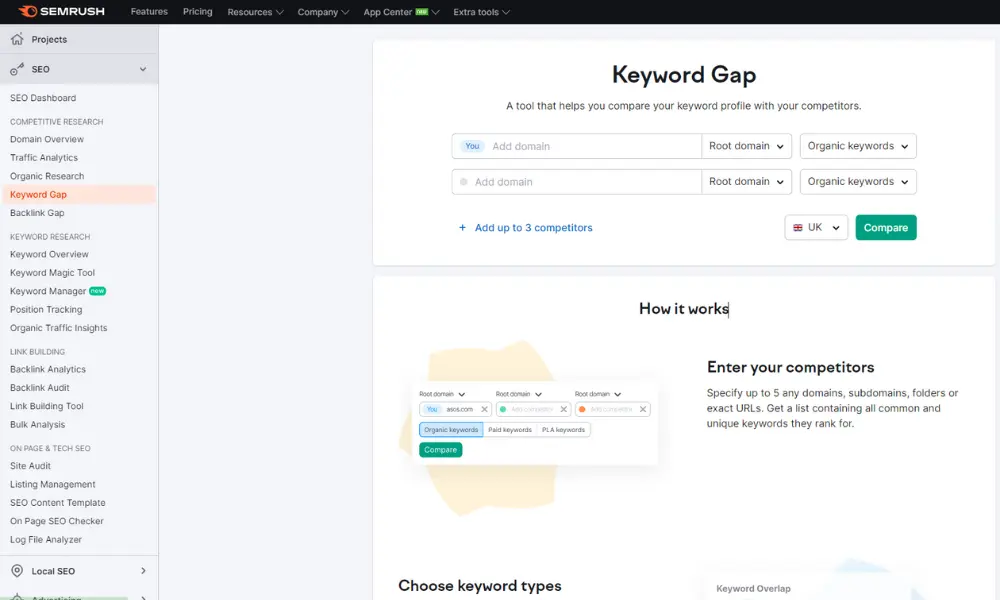Keyword Research Importance For SEO
Keyword research allows you to uncover the specific words and phrases that potential customers are typing into search engines. You gain valuable insights into their intent, preferences, and pain points by identifying these keywords. Armed with this knowledge, you can tailor your content, optimize your website, and craft effective marketing strategies to reach and engage your audience effectively.
Without comprehensive keyword research, your online marketing efforts may fall flat, resulting in missed opportunities and lacklustre performance. It’s like trying to navigate a maze blindfolded – you’ll stumble around, wasting time and resources, without ever reaching your destination.
At our SEO Agency in Leeds, we are dedicated to providing high-quality SEO services to small businesses like yours. Through comprehensive keyword research, targeted optimization, and strategic implementation, we help businesses improve their visibility, drive organic traffic, and achieve their online goals. By incorporating SEMrush into our SEO strategies, we have witnessed remarkable results for our clients, and we believe you can achieve the same.
Keyword Research Basics: Understanding Keyword Research
A. Definition and Purpose of Keyword Research
Keyword research is the process of identifying and analyzing the specific words and phrases that people use when searching for information, products, or services on search engines like Google, Bing, or Yahoo. It involves understanding the language and intent of your target audience and using that knowledge to optimize your online presence accordingly.
The purpose of keyword research is twofold. Firstly, it helps you understand the language and terminology your potential customers use. By uncovering the exact keywords they’re typing into search engines, you gain insights into their needs, interests, and pain points. This understanding allows you to create relevant and engaging content that resonates with your audience.
Secondly, keyword research enables you to optimize your website, blog, or online store for search engine visibility. Search engines rely on keywords to determine the relevance and quality of web pages. By strategically incorporating relevant keywords into your content, meta tags, headings, and other on-page elements, you increase your chances of appearing in search engine results pages (SERPs) and attracting organic traffic.
B. Benefits of Conducting Thorough Keyword Research
Conducting thorough keyword research offers a wide range of benefits for your online marketing efforts:
- Enhanced Visibility: By identifying and targeting the right keywords, you can improve your website’s visibility in search engine results. Appearing on the first page of SERPs increases the likelihood of attracting organic traffic and gaining exposure to a larger audience.
- Targeted Traffic: Keyword research helps you attract highly relevant traffic to your website. By understanding the specific words and phrases your target audience uses, you can align your content with their needs and intentions. This leads to better engagement, higher conversion rates, and increased customer satisfaction.
- Competitive Advantage: Keyword research allows you to uncover opportunities and gain a competitive edge. By analyzing competitor keywords and identifying gaps in their strategies, you can tailor your content and marketing campaigns to target underserved areas of the market. This can result in higher visibility, increased market share, and improved brand positioning.
- Content Optimization: Keyword research provides valuable insights for optimizing your content. By strategically incorporating keywords into your titles, headings, meta descriptions, and body text, you improve the search engine visibility and relevance of your pages. Well-optimized content is more likely to rank higher and attract organic traffic.
- Long-Term Strategy: Keyword research is not a one-time activity. It is an ongoing process that helps you stay ahead of trends, evolving search behaviours, and emerging opportunities. By regularly monitoring and adapting your keyword strategy, you can maintain a competitive edge and drive sustainable growth.
Thorough keyword research is essential for understanding your target audience, optimizing your online presence, and gaining a competitive advantage in the digital marketplace. It allows you to align your content, SEO efforts, and marketing strategies with the specific needs and language of your audience, resulting in improved visibility, targeted traffic, and long-term success.
Getting Started with SEMrush: Best SEO Keyword Tool
A. Overview of SEMrush Features and Functionalities
SEMrush offers a wide range of features and functionalities that make it a powerful tool for keyword research and online marketing. Here are some key features to familiarize yourself with:
- Keyword Analytics: SEMrush’s Keyword Analytics tool provides comprehensive data and insights on keywords. You can explore search volume, keyword difficulty, trends, and related keywords, allowing you to make informed decisions about which keywords to target.
- Competitive Research: SEMrush allows you to analyze your competitors’ online strategies. You can discover their top-ranking keywords, evaluate their backlinks, and uncover gaps in their strategies. This information helps you refine your own keyword targeting and gain a competitive advantage.
- Site Audit: SEMrush’s Site Audit feature helps you identify and fix technical SEO issues on your website. It scans your site for errors, warnings, and other optimization opportunities, providing actionable recommendations to improve your site’s performance and visibility.
- Backlink Analysis: Backlinks are crucial for SEO, and SEMrush’s Backlink Analysis feature enables you to explore your own backlink profile and analyze your competitors’ backlink strategies. You can identify high-quality backlink opportunities, assess the authority of linking domains, and monitor the growth of your backlink profile.
- Social Media Tracker: With SEMrush, you can track your social media performance and monitor your competitors’ social media activities. You can measure engagement metrics, analyze content performance, and gain insights to optimize your social media strategy.
B. How to Set Up an SEMrush Account and Get a Special 14-Day Trial

Setting up a SEMrush account and accessing a special 14-day trial is easy using our partnership link provided:
- Visit the SEMrush website through our SEMrush partnership link to access the extended 14-day trial. Click here to start your free 14-day trial with SEMrush.
- Once on the website, click on the “TRY IT FREE” button.
- Create your account by providing your email address and setting a password. Alternatively, you can sign up using your Google account.
- Enter your billing information, by accessing our partnership link, you will automatically receive the extended 14-day trial instead of the standard 7-day trial.
- Complete the registration process, and you’ll be redirected to the SEMrush dashboard.
By following these steps and using our partnership link, you can easily set up a SEMrush account and enjoy an exclusive 14-day trial period. This extended trial gives you ample time to explore the platform’s features and functionalities, empowering you to make informed decisions for your online marketing efforts.
Find Keyword Ideas: Discover Profitable Keywords using the Keyword Research Tool
A. Using the Keyword Magic Tool for Keyword Ideas

SEMrush offers a powerful tool called the Keyword Magic Tool that can help you discover a wide range of keyword ideas for your online marketing campaigns. Follow these steps to leverage this tool effectively:
- Access the SEMrush dashboard and navigate to the SEO – Keyword Research – Keyword Magic Tool
- Enter a seed keyword or a topic relevant to your business or niche in the search bar. The Keyword Magic Tool will generate a list of related keywords.
- Explore the keyword suggestions provided by the tool. You can view a wide range of keyword variations, including long-tail keywords, related terms, and even questions that users commonly search for.
B. Filtering and Sorting Keywords Based on Relevancy and Competition
After generating a list of keyword ideas using the Keyword Magic Tool, it’s important to filter and sort the keywords based on their relevancy and competition. Here’s how you can do it:
Target Keyword Relevancy
Use the filtering options available in the Keyword Magic Tool to narrow down the keyword list based on relevancy. You can filter by keyword length, search volume, keyword difficulty, and other factors that align with your campaign goals. This step ensures that you focus on keywords that are most relevant to your target audience and business objectives.
Find Keyword Competition
Assessing keyword competition is crucial for optimizing your chances of ranking well in search engine results. SEMrush provides a keyword difficulty score that helps you evaluate the level of competition for each keyword. Aim for a balance between keywords with decent search volume and relatively lower competition to maximize your chances of ranking higher.
C. Identifying Long-Tail Keywords for Targeted Optimization
In addition to targeting broad keywords, incorporating long-tail keywords into your strategy can yield significant benefits. Long-tail keywords are more specific and typically have lower search volumes but higher intent. Here’s how you can identify and leverage long-tail keywords:
Analyze Keyword Variations
While using the Keyword Magic Tool, pay attention to the long-tail keyword variations that are suggested. These are often longer and more specific keyword phrases that capture the intent of users with higher precision.
Focus on search Intent and Specificity
Long-tail keywords often indicate more focused user intent. Consider the specific pain points, queries, or needs that your target audience may have and incorporate those into your long-tail keyword strategy. By addressing specific user needs, you can attract more qualified traffic to your website.
Leverage Targeted Optimization
Long-tail keywords offer an opportunity for targeted optimization. Create content and optimize your web pages around these keywords to provide in-depth and relevant information to your audience. Long-tail keywords can help you target niche markets, enhance your conversion rates, and establish yourself as an authority in your specific domain.
By utilizing the Keyword Magic Tool, filtering and sorting keywords based on relevancy and competition, and identifying long-tail keywords, you can discover profitable keywords to enhance your online marketing campaigns. These strategies empower you to align your content and SEO efforts with the specific needs and preferences of your target audience, resulting in higher visibility, increased traffic, and improved conversion rates.
In the following sections, we will delve deeper into advanced techniques and features within SEMrush to further optimize your keyword research process.
Analyzing Competitor Keywords

A. Leveraging SEMrush’s Competitive Research Tools
One of the key advantages of using SEMrush for keyword research is its comprehensive suite of competitive research tools. These tools allow you to gain valuable insights into your competitors’ keyword strategies and identify opportunities to outperform them. Here’s how you can leverage SEMrush’s competitive research tools:
- Access the SEMrush dashboard and navigate to the Competitive Research section.
- Explore the different tools available, such as “Organic Research,” “Advertising Research,” and “Backlink Analytics.” Each tool provides specific data and insights related to different aspects of your competitors’ online presence.
Use these tools to analyze your competitors’ keyword rankings, advertising strategies, backlink profiles, and more. This information helps you understand their strengths, weaknesses, and the keywords they are targeting to drive traffic and conversions.
B. Finding Your Competitors’ Top-Ranking Keywords
Identifying your competitors’ top-ranking keywords is a crucial step in developing your own keyword-targeting strategy. By understanding which keywords are driving traffic and visibility for your competitors, you can gain insights into high-performing keywords within your industry. Here’s how you can find your competitors’ top-ranking keywords using SEMrush:
- In the Competitive Research section of SEMrush, select the “Organic Research” tool.
- Enter your competitor’s domain or URL in the search bar and click on “Search.”
- SEMrush will provide a wealth of data about your competitor’s organic search performance, including their top-ranking keywords, organic traffic estimates, and more.
- Analyze the top-ranking keywords and identify those that are relevant to your business. Pay attention to keywords with high search volumes and low keyword difficulty, as they may present opportunities for you to target similar keywords and attract a share of their traffic.
C. Evaluating Competitor Keyword Strategies and Gaps
Once you have identified your competitors’ top-ranking keywords, it’s essential to evaluate their keyword strategies and identify any gaps or opportunities that you can leverage. Here’s how you can evaluate competitor keyword strategies using SEMrush:
Analyze Keyword Overlap
Compare your own list of target keywords with your competitors’ top-ranking keywords. Identify the keywords that both you and your competitors are targeting. This analysis helps you understand which keywords are critical for your industry and indicates areas of direct competition.
Identify Keyword Gaps
Look for keywords that your competitors are ranking for, but you are not. These are potential opportunities for you to optimize your content and improve your search visibility. By addressing these keyword gaps, you can attract new organic traffic and gain an advantage over your competitors.
Study Content Strategy
Examine your competitors’ content that ranks well for target keywords. Analyze the quality, depth, and relevance of their content. By understanding what works for them, you can optimize your own content to meet or exceed those standards, thereby improving your chances of ranking higher.
Track Competitor Performance
Utilize SEMrush’s tools to monitor changes in your competitors’ keyword rankings, organic traffic, and overall performance over time. This ongoing analysis allows you to stay informed about shifts in their strategies and identify emerging trends or opportunities.
By leveraging SEMrush’s competitive research tools, analyzing your competitors’ top-ranking keywords, and evaluating their keyword strategies and gaps, you can gain valuable insights into your industry landscape. This knowledge empowers you to refine your keyword targeting, optimize your content, and stay ahead of the competition. In the following sections, we will explore additional techniques and features within SEMrush to further enhance your keyword research and online marketing efforts.
Advanced Keyword Research Techniques

A. Using SEMrush’s Keyword Gap Tool to Uncover Opportunities
SEMrush’s Keyword Gap tool is a powerful feature that helps you identify keyword opportunities by comparing your website’s keyword rankings with those of your competitors. Follow these steps to uncover valuable insights using the Keyword Gap tool:
- Access the SEMrush dashboard and navigate to the Competitive Research section.
- Select the “Keyword Gap” tool.
- Enter your website and the websites of your competitors into the tool.
- Analyze the results to identify keywords that your competitors are ranking for, but you are not. These keywords represent potential opportunities for you to optimize your content and increase your search visibility.
- Pay attention to keywords with high search volumes and relatively low competition. These are keywords where your competitors are performing well, but you have the potential to outrank them with strategic optimization.
B. Exploring Related Keywords and Semantic Search
Incorporating related keywords and understanding semantic search can greatly enhance your keyword research. Here’s how you can leverage related keywords and semantic search using SEMrush:
- Utilize the Keyword Magic Tool or the related keyword suggestions within SEMrush to identify keywords that are semantically related to your primary target keywords.
- Incorporate these related keywords into your content to enhance its relevance and comprehensiveness. By doing so, you can attract a broader range of relevant search queries and improve your chances of ranking higher in search engine results.
- Pay attention to semantic search, which focuses on the meaning and intent behind user queries rather than relying solely on exact keyword matches. Understand the context in which your target keywords are used and create content that satisfies the user’s intent. This approach helps you optimize your content for both search engines and user experience.
C. Incorporating User Intent Analysis into Keyword Research
Understanding user intent is crucial for effective keyword research. By analyzing user intent, you can align your content and optimization strategies with what users are truly seeking. Here’s how you can incorporate user intent analysis into your keyword research:
- Study the search engine results pages (SERPs) for your target keywords. Analyze the types of content that appear in the top positions. Are the results informational, transactional, or navigational? This analysis provides insights into the intent behind the keyword.
- Leverage the “Keyword Overview” or “SERP Features” sections within SEMrush to identify user intent for specific keywords. These sections provide information about the types of content that typically rank for a given keyword.
- Create content that matches the user intent identified. This involves understanding whether users are seeking information, looking to make a purchase, or trying to navigate to a specific website. Tailor your content to address the user’s intent and provide the most relevant information or solution.
By using SEMrush’s Keyword Gap tool, exploring related keywords and semantic search, and incorporating user intent analysis, you can take your keyword research to the next level. These advanced techniques allow you to uncover untapped opportunities, optimize your content for semantic search, and provide the information users are looking for. In the subsequent sections, we will explore additional strategies and features within SEMrush to further enhance your keyword research and online marketing efforts.
Recap of the Importance of Keyword Research For SEO
Keyword research is a vital component of any successful online marketing strategy. By understanding the keywords that your target audience is using, you can optimize your content, improve your search engine rankings, and attract relevant traffic to your website. Through this guide, we have highlighted the significance of keyword research in driving online success for small businesses.
In conclusion, keyword research is a fundamental aspect of online marketing success. With SEMrush as your trusted tool, you can gain a competitive edge, attract more customers, and propel your business towards growth. Start your keyword research journey today and unlock the potential of SEMrush to elevate your online presence and drive tangible results.
Remember, we are an SEO Agency based in Leeds, specializing in providing SEO services to small businesses in Leeds and throughout Yorkshire. If you need expert assistance in optimizing your website, improving your search engine rankings, and reaching your target audience, don’t hesitate to reach out to us. Together, we can create an effective SEO strategy tailored to your business needs.

